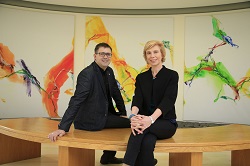Events
Targeting Therapies: Exploring the Cultural & Normative Dimensions of ‘Targeted’ Approaches to Biomedicine and Public Health
Multidisciplinary Conference
University College Dublin, Ireland
2nd – 3rd May 2024
Programme
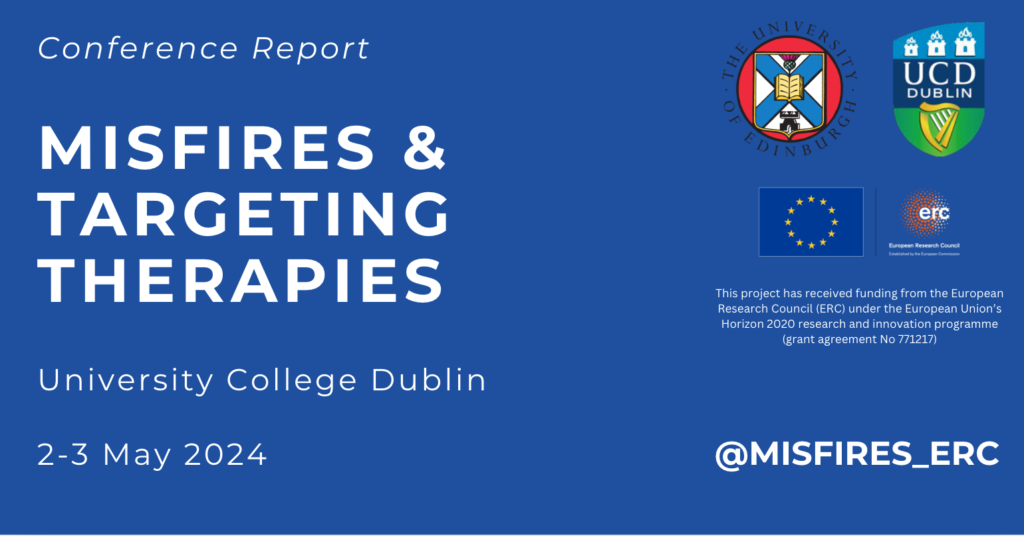
To view our above Conference Report please click here.
It is increasingly common for governments to commit, symbolically and economically, to dreams of therapeutic innovation in healthcare. This often relates to ‘targeted’ approaches, such as pharmaceuticals aimed at very specific kinds of disease (e.g. certain cancers), which might respond only to people with particular genetic variants – imagined and innovated through the idiom of ‘precision’ and ‘personalised’ medicine. At the same time, we can see other ‘targeted’ approaches to healthcare in action; for instance, psychological therapy services tailored to specific populations and interventions that stratify and construct publics in response to existing and emerging forms of illness (e.g. restrictions on the movements of groups regarded as highly vulnerable to COVID-19; increasingly narrow stratification of mental health diagnoses etc).
Through this conference, we will critically examine the design, delivery, and implications of ‘targeted’ biomedicine and public health to help us to better understand the dynamics between science, healthcare, and society. While research from the humanities and social sciences on biomedicine and public health often keeps these domains apart, our event will seek to consider the commonalities between them.
We welcome approaches from bioethics, gender studies, history, law, medical humanities, political philosophy, and science studies (among others) to explore the cultural and normative dimensions of ‘targeted’ approaches and interventions in biomedicine and public health. Through comparative analysis across these disciplines, we hope the event will help us to explore how different cultural, historical, legal, scientific, and healthcare contexts interact in the shaping and deployment of ‘targeted’ approaches. We invite papers that consider how societal histories, traditions, and legal processes affect how medical research is funded and conducted and how healthcare is prioritised and delivered. We also look forward to presentations that will examine how law, ethics, and cultures are impacted and contoured through targeted approaches to health.
+++++++++++++++++++++++++++++++++++++++
Past Events
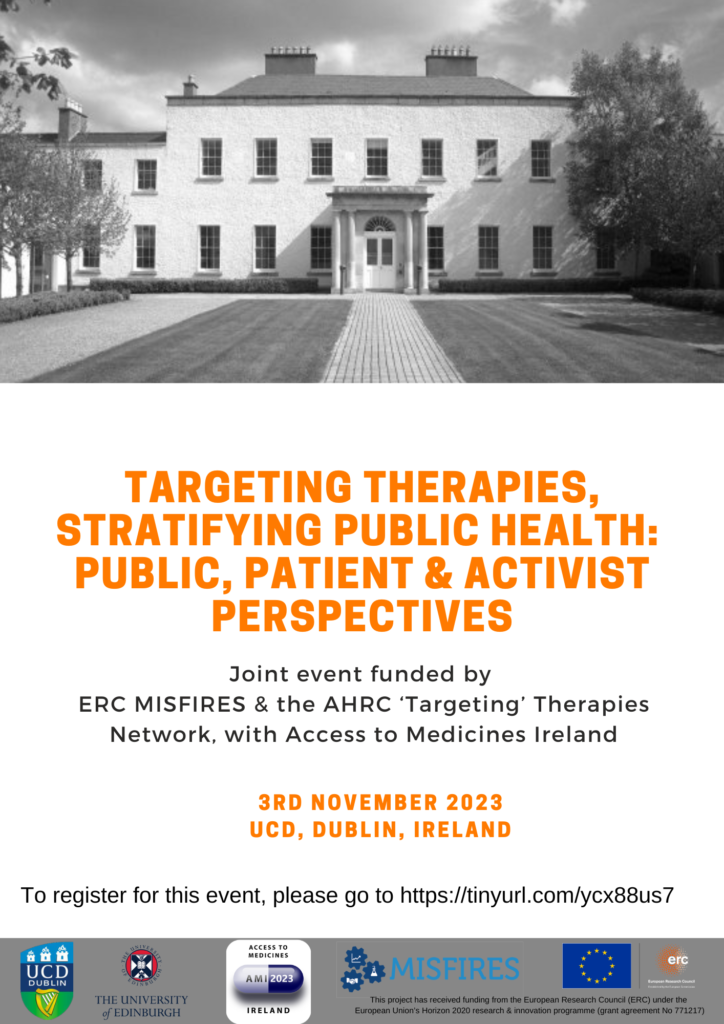
A report on the Targeting Therapies, Stratifying Public Health: Public, Patient & Activist Perspectives Workshop can be found here.
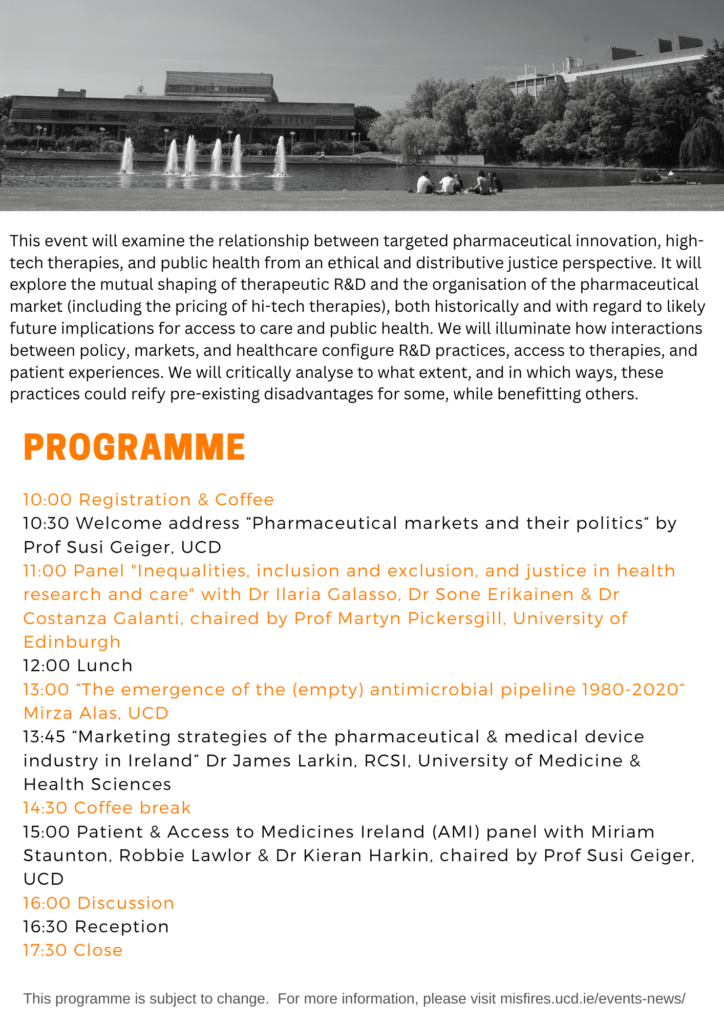
++++++++++++++++++++++++++++++++++++++++++++++++++++++++++++++++++++
Global Relational Thinking in Healthcare Research
9.00am to 12.45pm (Irish Standard Time) on 6th September 2023
(Virtual on Zoom)
Fernandos Ongolly and Prof Susi Geiger designed and organised an international online workshop on “Global Relational Thinking” that took place on Wednesday 6th September from 9am – 12.30pm. This workshop is a key part of the research being undertaken in the ERC project MISFIRES led by Prof Susi Geiger. Fernandos Ongolly, a PhD student in the project, also presented his research in conjunction with Prof Geiger on “Access to Health from Relational Perspectives: A Comparative Case of Ubuntu and Ethics of Care as Applied in HIV Pre-Exposure Prophylaxis Access”.
The presentations at the workshop covered a wide range of research in the area of global relational thinking, including “Women in Palliative Care and Health Service Delivery in India”, “Designing inclusive health insurance for the informal sector workers in Kenya” and “The Sustainability of AI-enabled health research”. Following the discussions from the workshop, the project will explore further research collaborations with the presenters and attendees.
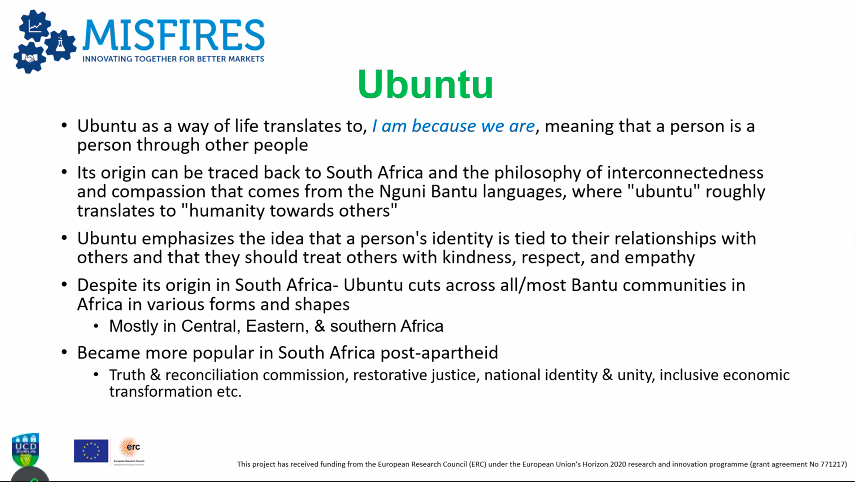
+++++++++++++++++++++++++++++++++++++++++++++++++++++++++++++++++++++++++++++

Creative Activism Workshop
Friday 15th October 2021 1-5pm (IST)
MISFIRES is a research initiative bringing together an inter-disciplinary group of researchers interested in exploring and promoting change in healthcare markets. In our work, we collaborate with and support activist and advocacy groups in their endeavours to make a difference.
The MISFIRES’ team will hold a 4 – hour workshop on Creative Activism delivered by the ‘artivist’ organisation Beautiful Trouble. The workshop will bring together advocates and activists from different areas of healthcare to collectively engage,learn and imagine new possibilities for healthcare activism.
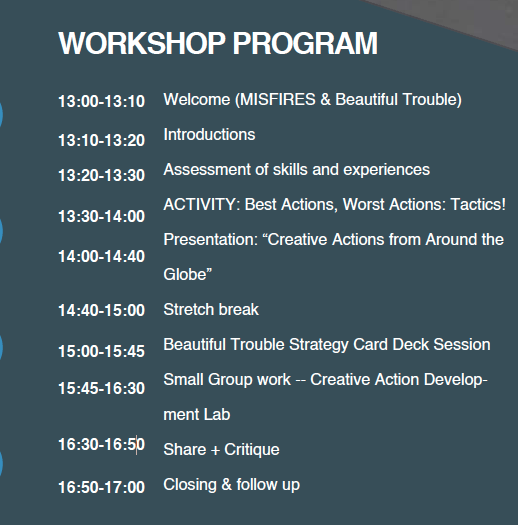
For more information please email misfires@ucd.ie
+++++++++++++++++++++++++++++++++++++++++++++++++++++++++++++++++++++++++++
SolPan: Citizen’s experiences during C-19
Wednesday 3rd March 2pm – 2.30pm
Prof Susi Geiger and Dr Ilaria Galasso explore the role of solidarity in the management of the Covid19 pandemic in the Irish context.
About this Event
“Solidarity in times of a pandemic (SolPan): an international qualitative study on citizen’s experiences during Covid19”
In this presentation we explore the role of solidarity in the management of the Covid19 pandemic by focusing on the Irish context.
We provide an overview of the international project this research is part of: SolPan, a qualitative, comparative and longitudinal interview study of citizens’ experiences during the pandemic. The study involves 9 European countries and applies a “data commons” infrastructure (Kieslich et al. 2020, in review).
As part of SolPan, we conducted a series of in-depth interviews in Ireland in April 2020 and again in October 2020 to investigate how people adapted and responded to the pandemic and the ensuing policy measures over time.
In line with the broader study, we focus our analysis on practices of solidarity, defined as “enacted commitments to accept costs to assist others with whom a person or persons recognise similarity in a relevant respect.” (Prainsack and Buyx 2017, p.43).
We analyze behaviors and normative positions emerging from the interviews in terms of protecting and supporting others, as well as their evolution from the first to the second round of interviews, by critically contrasting solidarity with other forms of commitments such as caring, civic duty and forms of moral reasoning.
The team of researchers from UCD working on SolPan are part of the ERC MISFIRES’ project, led by Prof Susi Geiger on market failures in healthcare, grant agreement 771217. For more information on MISFIRES, the SolPan research or the team of researchers please visit https://misfires.ucd.ie/
+++++++++++++++++++++++++++++++++++++++++++++++++++++++++++++++++++++++++++++
Market Studies Doctoral Workshop 2021
Thursday 28th & Friday 29th January 2021
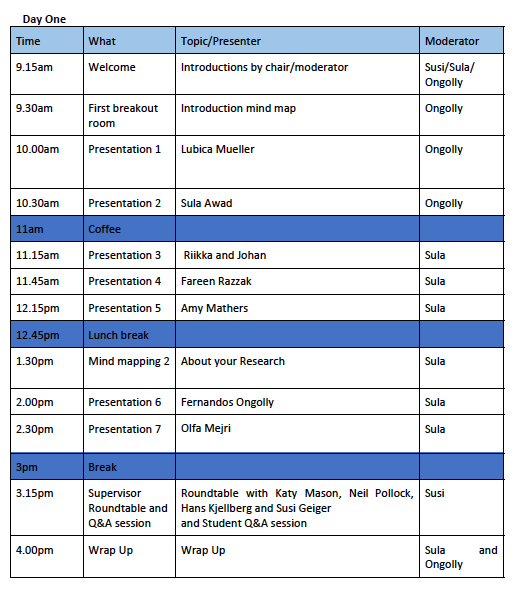
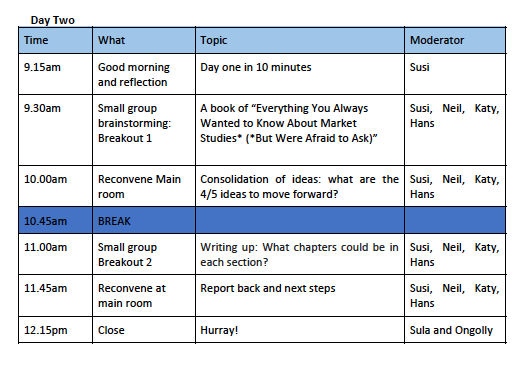
++++++++++++++++++++++++++++++++++++++++++++++++++++++++++++++++++++++
Research on the Pandemic
virtual event
Friday 6th and Friday 27th November 2020
Link to register
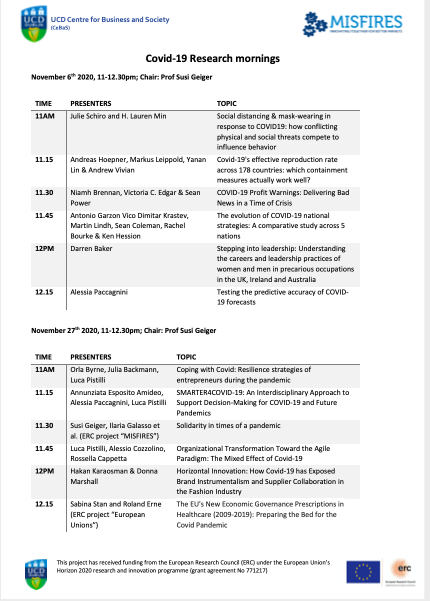
+++++++++++++++++++++++++++++++++++++++++++++++++++++++++++++++++++
120 Beats per Minute
Free Film Screening and Live Debate
Monday 6th April 2020 – postponed until further notice
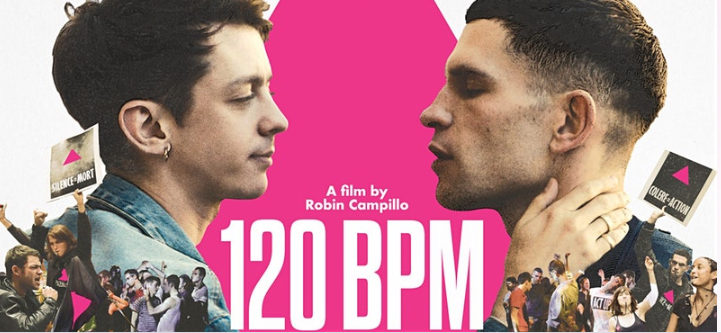
As part of Access to Medicines Ireland 2020 programme, there will be a screening and live debate about 120 BPM, a movie on AIDS activism.
About this Movie
Directed by French director Robin Campillon, 120 Beats Per Minute (2017) is a beautiful movie about activism, homosexuality and the AIDS epidemic in France in the 1990s. It traces a pivotal moment in healthcare activism.
About this Event
The movie will be screened at Nightingale Lecture Theatre (2nd floor) RCSI, 123 St Stephen’s Green, Dublin 2.
The movie will be followed by a live debate with the audience from 8:00pm to 8:30pm and a panel to be announced . Entrance is free but spaces are limited.
This event is included in the programme of the Access to Medicines Ireland 2020 conference. It is organised by University College Dublin’s ERC project MISFIRES (Susi Geiger, Théo Bourgeron, Fernandos Ongolly), with the support of the Irish Global Health Network and the RCSI.
About the AMI Conference
A panel of leading international experts, patient advocates and pharmaceutical industry representatives will come together in Dublin on April 7 to discuss the current model of drug development and propose interventions and alternative models that place population health front and centre, while reducing the price of new medicines.
A Short Synopsis of the Movie
In the early 1990s, a group of HIV/AIDS activists associated with the Paris chapter of ACT UP struggle to effect action to fight the AIDS epidemic. While the French government has declared its intent to support HIV/AIDS sufferers, ACT UP stages public protests against their sluggish pace, accusing the government of censoring and minimizing the fight against the disease. When the pharmaceutical company Melton Pharm announces its plans to reveal its HIV trial results at a prominent pharmaceutical conference the following year, ACT UP invades its offices with fake blood and demands it release its trial results immediately.
While ACT UP makes some headway with its public protests, its members fiercely debate the group’s strategy, with conflicting goals of showmanship and persuasion, with conflicting aesthetics of positivity and misery. ACT UP struggles to plan a more effective Gay Pride parade than in previous years, bemoaning the depressing, “zombie” atmosphere the AIDS epidemic had created. The film gradually shifts from the political storyline of ACT UP’s actions to the personal stories of ACT UP members. Foreshadowing later events in the movie, Jeremie, an AIDS positive youth in the group sees his health deteriorate rapidly
+++++++++++++++++++++++++++++++++++++++++++++++++++++++++++++++++++++++++++
HEALTHCARE ACTIVISM BETWEEN MARKETS AND MORALS – tumultuous pasts, bright futures?
20TH September 2019, UCD, Dublin, Ireland
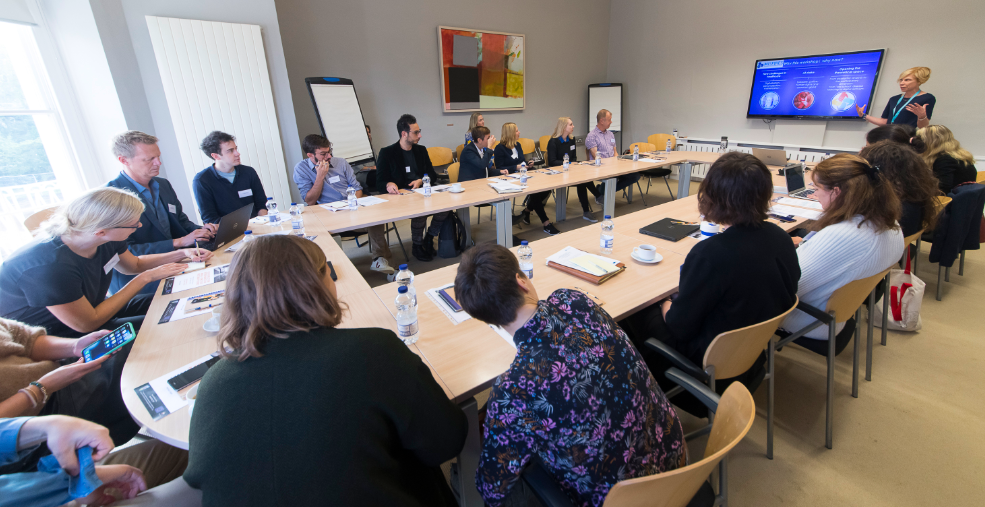
The interdisciplinary workshop “Healthcare activism between markets and morals” draws together scholarship and emerging research from disciplines including Science and Technology Studies, Sociology, Organisation Studies, Healthcare and Legal Studies to map existing knowledge on healthcare activism and to sketch a future research agenda at the crossroads of ‘upstream’ and ‘downstream’ healthcare activism. It is unique in the breadth of scholars that it aims to bring into conversation and in its ambition to draft an interdisciplinary research agenda that will advance knowledge for the common good.
Activism and collective action have a long history in the health domain, which has been traced by STS and healthcare studies. Where much of this activism has traditionally centered on participation and representation in healthcare research and innovation, activists have also started to address issues related to ‘downstream’ biomedical markets – for instance the pricing and distribution of drugs; patenting issues; or inequalities in the access to healthcare markets. It is probably fair to say that this scrutiny has only increased in recent years; for instance, the opioid crisis in the US has been publicly related to certain pharmaceutical marketing practices.
It is now timely to bring insights into ‘upstream’ healthcare activism together with those emerging insights on market-directed or ‘downstream’ healthcare activism. What do we know about how activists engage with specific biomedical markets, and to what extent can this knowledge help us understand dynamics in emerging areas such as consumer genomics or precision medicine? How do ethical and distributive challenges differ in today’s highly data-intensive healthcare practices from those faced in the early years of healthcare activism, and which challenges persist? How are these challenges expressed differently in different geographies, and how can healthcare activists globally ensure their voices are heard? Finally, what is the role and scope of the academic researcher to affect positive change in biomedical markets?
Workshop Agenda
8.30-9am Registration
9am Welcome to the workshop
9.10-10.30am Panel 1: Where do we come from? A historical perspective on healthcare activism. Speakers: Vololona Rabeharisoa, Ecole de Mines ParisTech and Steve Sturdy, University of Edinburgh
10.30-11am Coffee and pastries
11-12.45pm Parallel paper session 1
12.45-1.30pm Lunch
1.30-3.15pm Parallel paper session 2
3.15-3.30pm Coffee
3.45-5.00pm Panel 2: A market-based ethics for the 21stcentury. Speakers: Ine Van Hoyweghen, KU Leuven in Belgium and Klaus Høyer, University of Copenhagen.
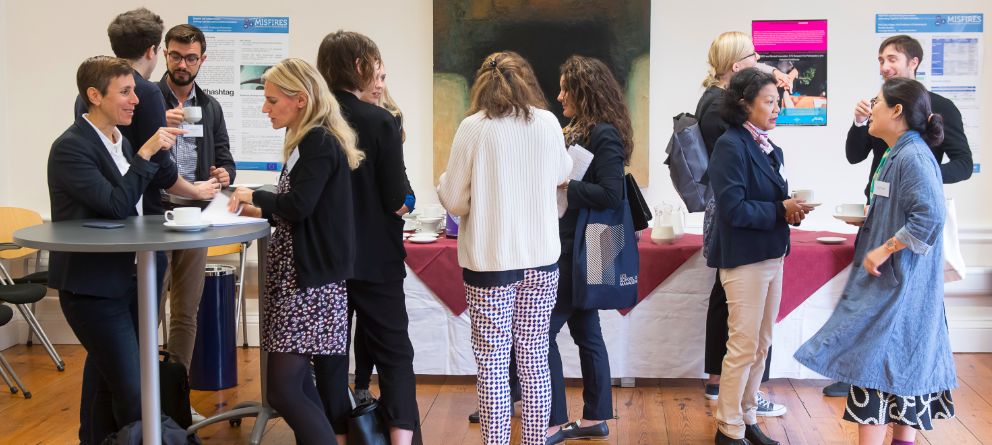
The workshop is organised by the research team of the ERC Consolidator project “MISFIRES and Market Innovation” (misfires.ucd.ie), and workshop contributions will be invited to an edited book. It will mark the inaugural workshop in a series of academic and public events as part of the MISFIRES research programme. Participation in the workshop is free and open to all. Early stage researchers (PhD students and postdoctoral researchers) who present a paper may be supported by travel bursaries.
If you are interested in giving an academic paper please send a 300 word abstract to gemma.watts@ucd.ie and susi.geiger@ucd.ie by March 1, 2019. If you are interested in attending the workshop without presenting a paper, please drop us an email too!
PLEASE NOTE THAT PLACES ARE LIMITED.
More details on event to be announced shortly, follow us on twitter @MISFIRES_ERC and to receive updates on this event #marketsandmorals and other MISFIRES activities.
++++++++++++++++++++++++++++++++++++++++++++++++++++++++++++++++++++++++++++
Patent Politics: Life Forms, Markets, and the Public Interest in the United States and Europe
WEDNESDAY 5TH JUNE 2019, 9:45am – 11.30am
PRESENTED BY PROFESSOR SHOBITA PARTHASARATHY,UNIVERSITY OF MICHIGAN
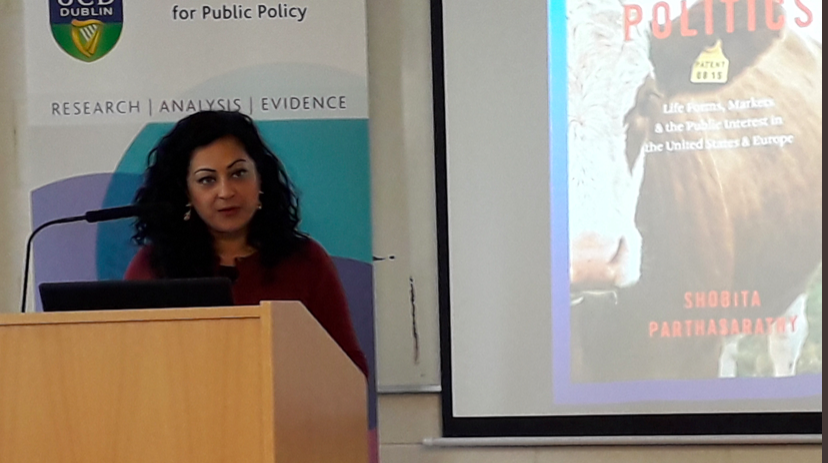
Geary Seminar Room, Room B003/B004, UCD Geary Institute for Public Policy
ABSTRACT: Over the past thirty years, the world’s patent systems have experienced pressure from civil society like never before. From farmers to patient advocates, new voices are arguing that patents impact public health, economic inequality, morality—and democracy. These challenges, to domains that we usually consider technical and legal, may seem surprising. But in Patent Politics, I argue that patent systems have always been deeply political and social. Using qualitative, interpretive methods, I analyze and compare a particularly fierce and prolonged set of controversies over patents on life forms linked to important advances in biology and agriculture and potentially life-saving medicines in the United States and Europe. Clashes over whose voices and which values matter in the patent system, as well as what counts as knowledge and whose expertise is important, look quite different in these two places. And through these debates, the United States and Europe are developing very different approaches to patent and innovation governance.
BIOSKETCH: Shobita Parthasarathy is Professor of Public Policy and Women’s Studies, and Director of the Science, Technology, and Public Policy Program, at University of Michigan. Her research focuses on the governance of emerging science and technology in comparative perspective. She is interested in how technological innovation, and innovation systems, can better achieve public interest and social justice goals, as well as in the politics of knowledge and expertise in science and technology policy. She has done research in the United States and Europe, and her current research focuses on India. She is the author of numerous articles and two books:Patent Politics: Life Forms, Markets, and the Public Interest in the United States and Europe(University of Chicago Press, 2017) and Building Genetic Medicine: Breast Cancer, Technology, and the Comparative Politics of Health Care (MIT Press, 2007). Patent Politics received the 2018 Robert K. Merton Award from the Science, Knowledge, and Technology section of the American Sociological Association, for an outstanding book on science, knowledge, or technology. Findings from Building Genetic Medicine influenced the 2013 US Supreme Court decision prohibiting patents on isolated human genes. She holds a Bachelor’s degree in Biology from the University of Chicago and Masters and PhD degrees in Science and Technology Studies from Cornell University.
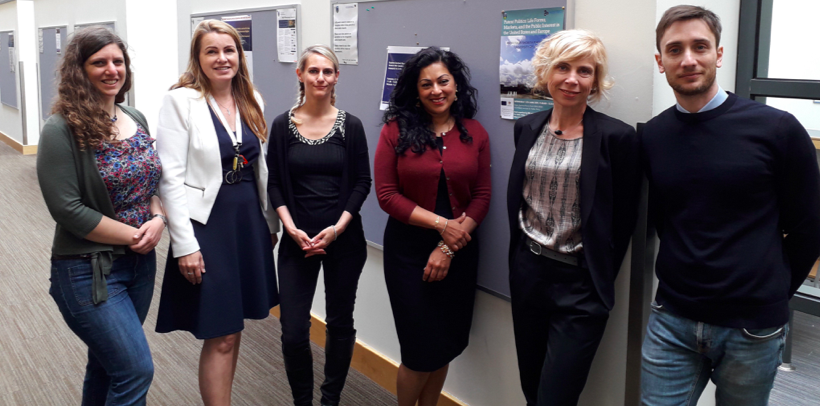
Shobita Parthasarathy, PhD
Professor of Public Policy and Women’s Studies (by courtesy)
Director, Science, Technology, and Public Policy Program
University of Michigan
http://shobitap.org/
Twitter: @ShobitaP
+++++++++++++++++++++++++++++++++++++++++++++++++++++++++++++++++++++++++++++
Geary Research Day – Thursday 13th December 2018 at the Geary Institute, University College Dublin, Ireland
Presentation on ERC MISFIRES & Market Innovation – Towards a Collaborative Turn in Organising Markets by Professor Susi Geiger @complexmarkets
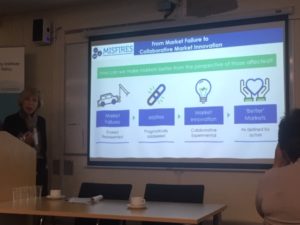
++++++++++++++++++++++++++++++++++++++++++++++++++++++++++++++++++++++++++
News
7 women crossing borders with their research
Silicon Republic 8 March 2021
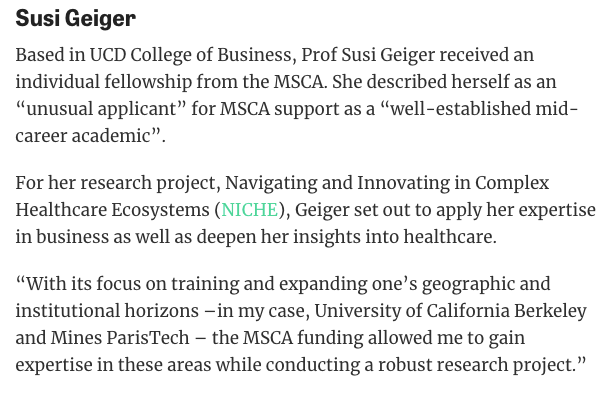

The impact of Marie Sklodowska-Curie Actions
funding on the careers of female researchers:
International Women’s Day 2021
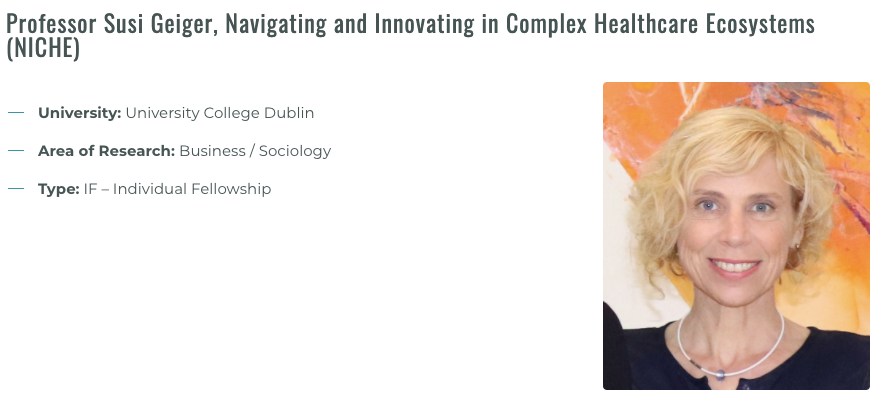
COVID-19: Researchers examine impact across
business and society
“Along with academics across the globe, faculty in the UCD College of Business adapted their research agendas during the year in response to the COVID-19 crisis. On November 6, the ERC MISFIRES project and UCD Centre for Business and Society (CeBaS) presented the first in a series of two Research Mornings highlighting the work of College faculty currently researching topics around the impact of COVID-19….”
“Green Transitions through Dynamics of Problematization”
Prof Susi Geiger was appointed to the Advisory Board of a new DFF (Independent Research Fund Denmark) funded project entitled “Green Transitions through Dynamics of Problematization”, jointly run by Aarhus University and Copenhagen Business School.
“In the ruins of capitalism. An audioguided fiction”
Dr Théo Bourgeron provided the text, with contributors Alix Denambride (voice), Madame Patate and Vincent Matyn (editing and mixing), Camille Lamy and Amandine Faugère (direction), Unbewitch finance (production), at the exhibition “Cabinet de Curiosités Economiques”, 18 September – 25 October 2020. Biennale de l’Image Possible, Liège (Belgium). An extract was broadcast on RTBF, the Belgium national radio broadcaster.
Interdisciplinary Reflections on
‘Patents as Capital’
Prof Susi Geiger was invited to be part of a blog series by ‘Patents as Scientific Information, 1895-2020’ (PASSIM), a five-year project funded by the European Research Council.
UCD Leadership in Healthcare Network
Conference
Prof Susi Geiger was an invited Chair of the session on “Implications for Public Policy and
Calls to Action”, at the Healthcare Network Conference on 19th September 2020.
Open Society Foundation
Prof Susi Geiger was invited to speak at and participate in a roundtable discussion on “The biggest merger of all – big pharma and tech”, organised by the Open Society Foundation, Sept 16 2020.
Access to Medicines Webinar
Prof Susi Geiger was an invited panel speaker at the IPPOSI (Irish Platform for Patient Organisations, Science & Industry) Access to Medicines Webinar on Sept 10, 2020. She discussed European frameworks for pharmaceutical innovation and access.
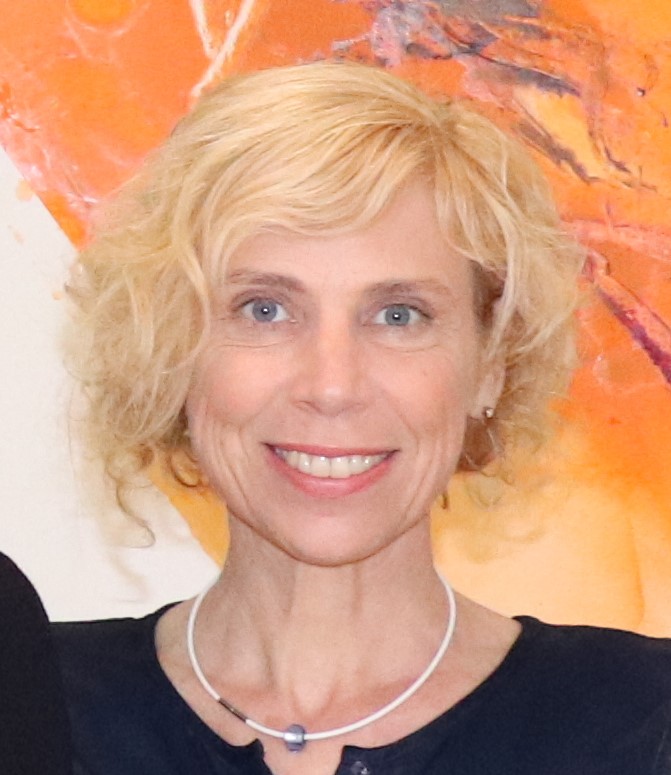
‘Social scientists play an important role
in the fight against Covid in Ireland’
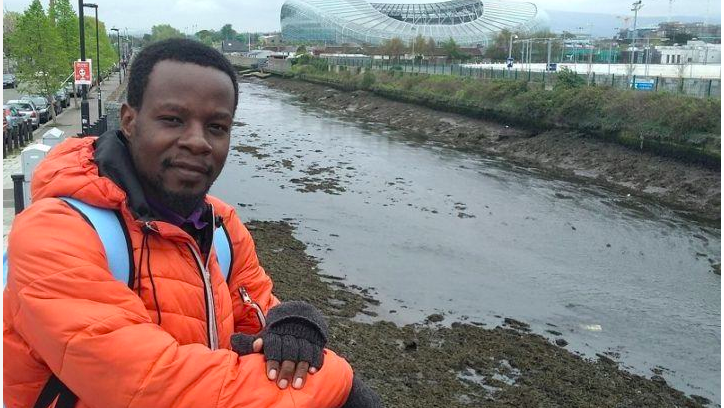
+++++++++++++++++++++++++++++++++++++++++++++++++++++++++++++++
Researchers from abroad help Ireland
fight COVID-19
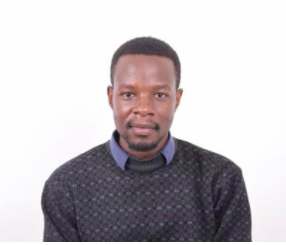
+++++++++++++++++++++++++++++++++++++++++++++++++++++++++++++++
Study: COVID 19 – How does it affect you
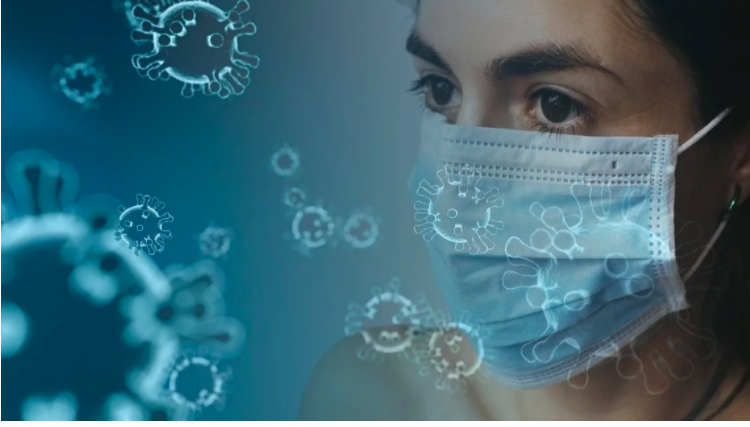
+++++++++++++++++++++++++++++++++++++++++++++++++++++++++++++++
MISFIRES Conference at UCD tackles the broken healthcare system

+++++++++++++++++++++++++++++++++++++++++++++++++++++++++++++++
‘University College Dublin Researchers Awarded €4m in European Research Council Funding for Archaeology and Business projects.’
